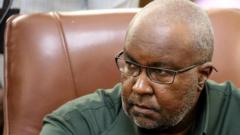Despite the recent overthrow of Bashar al-Assad, Syria's new leadership must contend with ongoing sectarian strife that threatens stability.
Syria's New Government Faces Sectarian Challenges Amidst hopes for Unity

Syria's New Government Faces Sectarian Challenges Amidst hopes for Unity
In a post-civil war Syria, the new government pledges unity while battling sectarian violence.
The aftermath of the Syrian civil war continues to unfold as the newly-established government attempts to foster national unity following the dramatic ousting of President Bashar al-Assad. However, persistent sectarian violence casts a long shadow over these aspirations, raising alarm among various minority communities.
Following the rebels' decisive victory in December, the new Sunni-majority government faces mounting concerns over its ability to safeguard minority groups amid rising attacks. Just recently, violent clashes erupted around Damascus, leading to the deaths of numerous Druse fighters and underscoring fears of extremist elements gaining ground in Syria.
The ongoing conflict has revealed the precarious position of minorities such as the Druse, Alawites, and Kurds, many of whom have formed their own armed factions during the civil war. Reports indicate that extremist factions within the same coalition that deposed Assad are primarily responsible for recent violent outbursts, raising questions about the new regime's capacity to maintain control.
In late April, an Assad-aligned minority, particularly around the coastal areas, suffered significant casualties, leading to international reactions. Israeli airstrikes targeted Syrian government positions purportedly to defend the Druse community, highlighting the intricate web of alliances and conflicts that intertwine the region's factions.
As the challenges mount, the newly formed government faces an uphill battle to quell violence and instill a lasting peace, striving to fulfill its promise of a unified Syria in the face of deep-rooted sectarian divides. The situation remains precarious, with armed groups from various minorities hesitant to disband in the absence of effective security guarantees.
Following the rebels' decisive victory in December, the new Sunni-majority government faces mounting concerns over its ability to safeguard minority groups amid rising attacks. Just recently, violent clashes erupted around Damascus, leading to the deaths of numerous Druse fighters and underscoring fears of extremist elements gaining ground in Syria.
The ongoing conflict has revealed the precarious position of minorities such as the Druse, Alawites, and Kurds, many of whom have formed their own armed factions during the civil war. Reports indicate that extremist factions within the same coalition that deposed Assad are primarily responsible for recent violent outbursts, raising questions about the new regime's capacity to maintain control.
In late April, an Assad-aligned minority, particularly around the coastal areas, suffered significant casualties, leading to international reactions. Israeli airstrikes targeted Syrian government positions purportedly to defend the Druse community, highlighting the intricate web of alliances and conflicts that intertwine the region's factions.
As the challenges mount, the newly formed government faces an uphill battle to quell violence and instill a lasting peace, striving to fulfill its promise of a unified Syria in the face of deep-rooted sectarian divides. The situation remains precarious, with armed groups from various minorities hesitant to disband in the absence of effective security guarantees.





















